University Assignment: Empowering Informal Carers in Palliative Care
VerifiedAdded on 2022/08/14
|7
|1754
|15
Literature Review
AI Summary
This literature review examines the critical role of empowering informal carers in palliative care, focusing on the impact of professional attributes on family members and loved ones during the end-of-life phase. The review synthesizes findings from various research studies, highlighting the challenges informal carers face due to lack of skills and knowledge, as well as the importance of assessing their needs and providing adequate resources. Key themes discussed include the need for training in medication administration, the significance of solicitude, and the impact of virtual carer systems. The review emphasizes that empowering informal carers through assessment, training, and support is essential for enhancing the quality of life and comfort of patients and their families during this difficult time. The analysis includes a summary table that highlights commonalities and key themes across different research studies, supporting the importance of empowerment in the provision of palliative care.
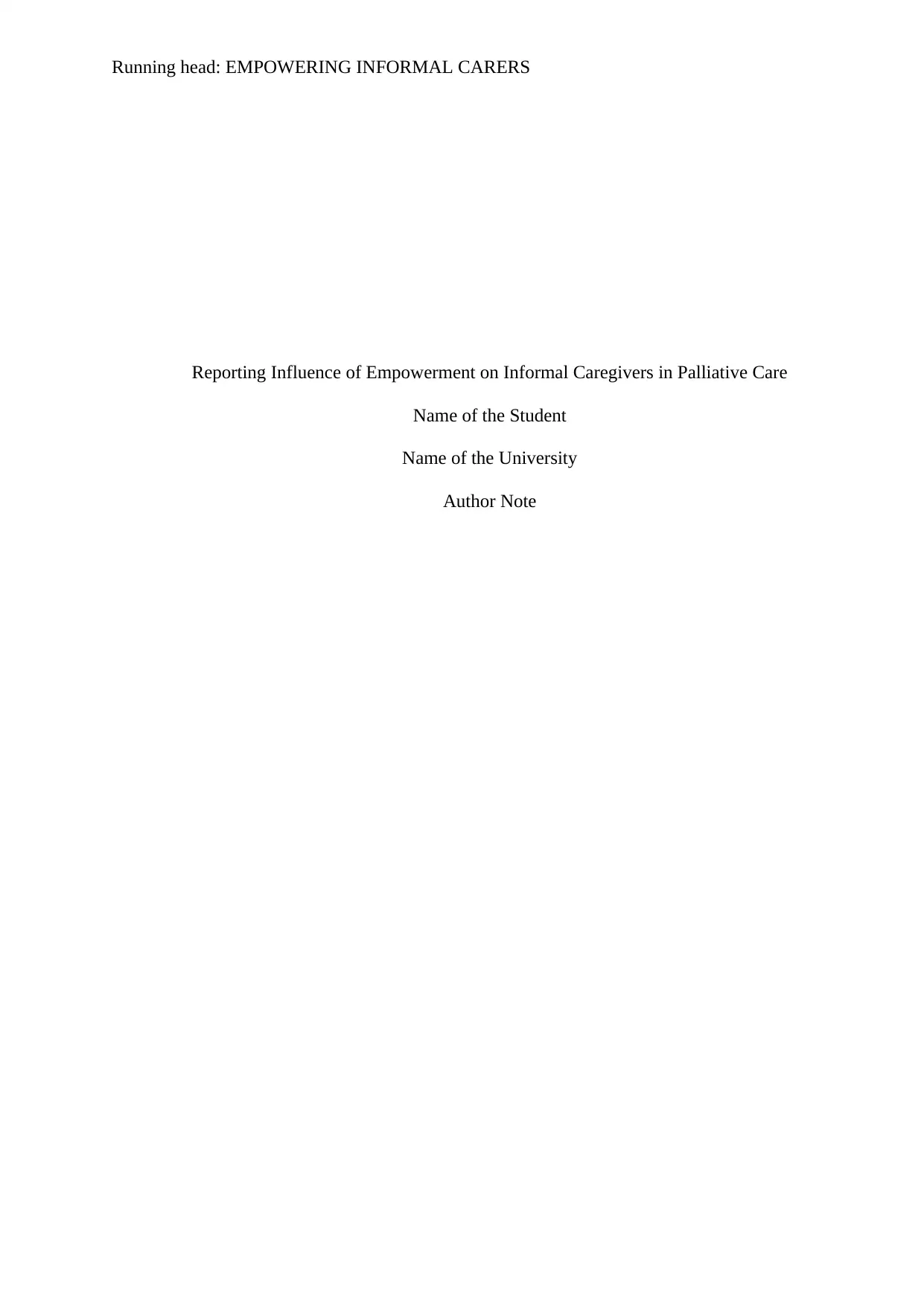
Running head: EMPOWERING INFORMAL CARERS
Reporting Influence of Empowerment on Informal Caregivers in Palliative Care
Name of the Student
Name of the University
Author Note
Reporting Influence of Empowerment on Informal Caregivers in Palliative Care
Name of the Student
Name of the University
Author Note
Paraphrase This Document
Need a fresh take? Get an instant paraphrase of this document with our AI Paraphraser
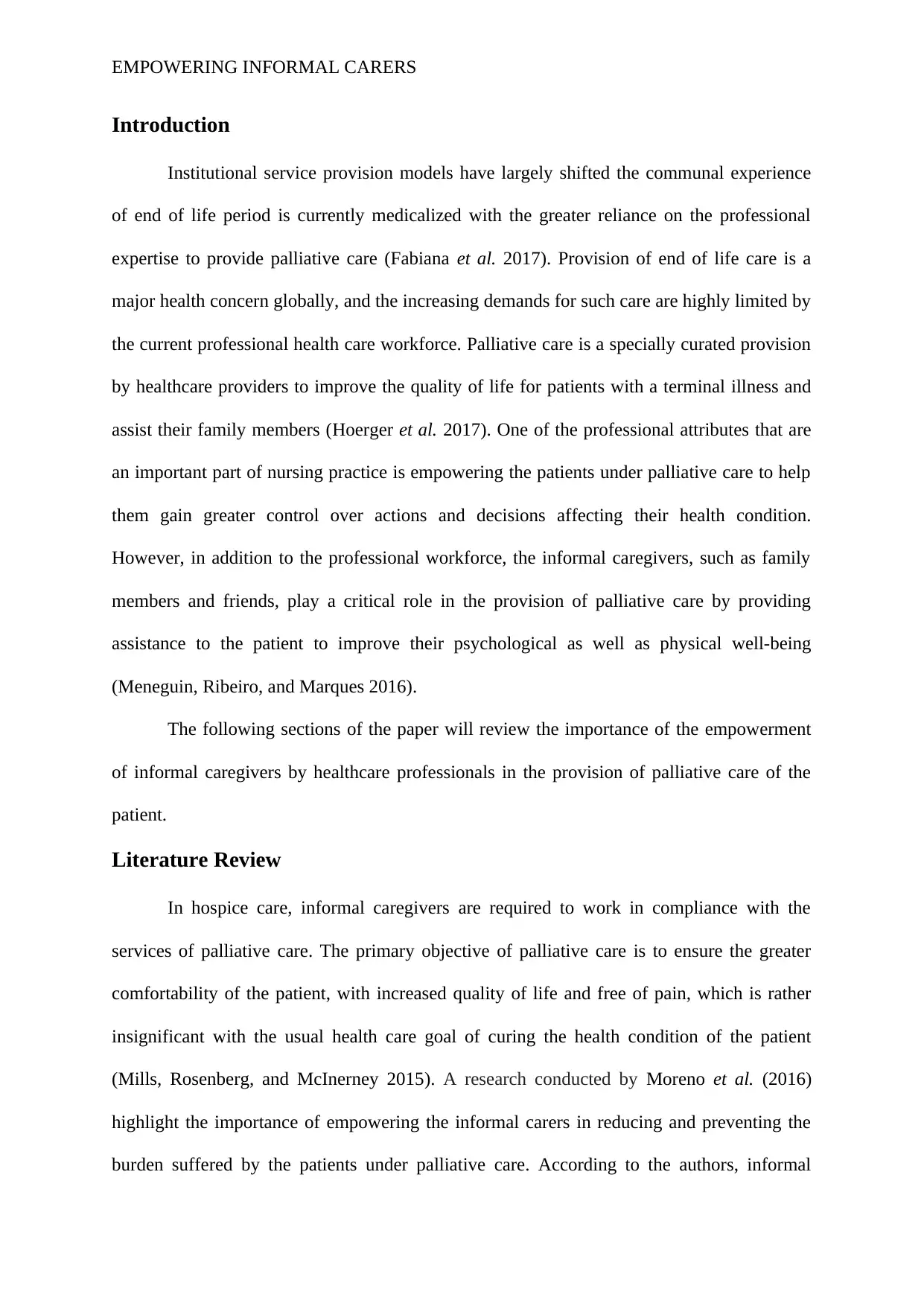
EMPOWERING INFORMAL CARERS
Introduction
Institutional service provision models have largely shifted the communal experience
of end of life period is currently medicalized with the greater reliance on the professional
expertise to provide palliative care (Fabiana et al. 2017). Provision of end of life care is a
major health concern globally, and the increasing demands for such care are highly limited by
the current professional health care workforce. Palliative care is a specially curated provision
by healthcare providers to improve the quality of life for patients with a terminal illness and
assist their family members (Hoerger et al. 2017). One of the professional attributes that are
an important part of nursing practice is empowering the patients under palliative care to help
them gain greater control over actions and decisions affecting their health condition.
However, in addition to the professional workforce, the informal caregivers, such as family
members and friends, play a critical role in the provision of palliative care by providing
assistance to the patient to improve their psychological as well as physical well-being
(Meneguin, Ribeiro, and Marques 2016).
The following sections of the paper will review the importance of the empowerment
of informal caregivers by healthcare professionals in the provision of palliative care of the
patient.
Literature Review
In hospice care, informal caregivers are required to work in compliance with the
services of palliative care. The primary objective of palliative care is to ensure the greater
comfortability of the patient, with increased quality of life and free of pain, which is rather
insignificant with the usual health care goal of curing the health condition of the patient
(Mills, Rosenberg, and McInerney 2015). A research conducted by Moreno et al. (2016)
highlight the importance of empowering the informal carers in reducing and preventing the
burden suffered by the patients under palliative care. According to the authors, informal
Introduction
Institutional service provision models have largely shifted the communal experience
of end of life period is currently medicalized with the greater reliance on the professional
expertise to provide palliative care (Fabiana et al. 2017). Provision of end of life care is a
major health concern globally, and the increasing demands for such care are highly limited by
the current professional health care workforce. Palliative care is a specially curated provision
by healthcare providers to improve the quality of life for patients with a terminal illness and
assist their family members (Hoerger et al. 2017). One of the professional attributes that are
an important part of nursing practice is empowering the patients under palliative care to help
them gain greater control over actions and decisions affecting their health condition.
However, in addition to the professional workforce, the informal caregivers, such as family
members and friends, play a critical role in the provision of palliative care by providing
assistance to the patient to improve their psychological as well as physical well-being
(Meneguin, Ribeiro, and Marques 2016).
The following sections of the paper will review the importance of the empowerment
of informal caregivers by healthcare professionals in the provision of palliative care of the
patient.
Literature Review
In hospice care, informal caregivers are required to work in compliance with the
services of palliative care. The primary objective of palliative care is to ensure the greater
comfortability of the patient, with increased quality of life and free of pain, which is rather
insignificant with the usual health care goal of curing the health condition of the patient
(Mills, Rosenberg, and McInerney 2015). A research conducted by Moreno et al. (2016)
highlight the importance of empowering the informal carers in reducing and preventing the
burden suffered by the patients under palliative care. According to the authors, informal
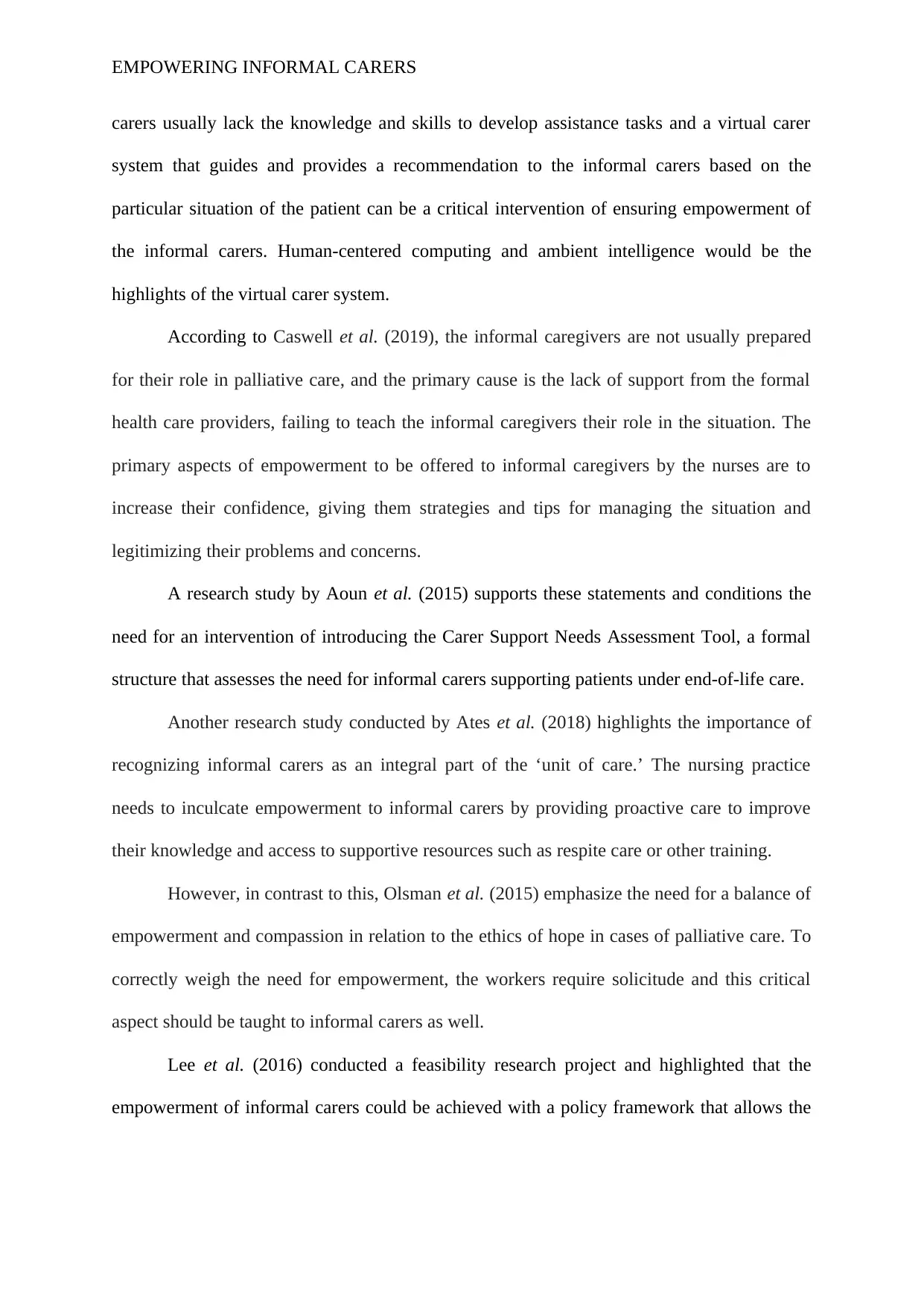
EMPOWERING INFORMAL CARERS
carers usually lack the knowledge and skills to develop assistance tasks and a virtual carer
system that guides and provides a recommendation to the informal carers based on the
particular situation of the patient can be a critical intervention of ensuring empowerment of
the informal carers. Human-centered computing and ambient intelligence would be the
highlights of the virtual carer system.
According to Caswell et al. (2019), the informal caregivers are not usually prepared
for their role in palliative care, and the primary cause is the lack of support from the formal
health care providers, failing to teach the informal caregivers their role in the situation. The
primary aspects of empowerment to be offered to informal caregivers by the nurses are to
increase their confidence, giving them strategies and tips for managing the situation and
legitimizing their problems and concerns.
A research study by Aoun et al. (2015) supports these statements and conditions the
need for an intervention of introducing the Carer Support Needs Assessment Tool, a formal
structure that assesses the need for informal carers supporting patients under end-of-life care.
Another research study conducted by Ates et al. (2018) highlights the importance of
recognizing informal carers as an integral part of the ‘unit of care.’ The nursing practice
needs to inculcate empowerment to informal carers by providing proactive care to improve
their knowledge and access to supportive resources such as respite care or other training.
However, in contrast to this, Olsman et al. (2015) emphasize the need for a balance of
empowerment and compassion in relation to the ethics of hope in cases of palliative care. To
correctly weigh the need for empowerment, the workers require solicitude and this critical
aspect should be taught to informal carers as well.
Lee et al. (2016) conducted a feasibility research project and highlighted that the
empowerment of informal carers could be achieved with a policy framework that allows the
carers usually lack the knowledge and skills to develop assistance tasks and a virtual carer
system that guides and provides a recommendation to the informal carers based on the
particular situation of the patient can be a critical intervention of ensuring empowerment of
the informal carers. Human-centered computing and ambient intelligence would be the
highlights of the virtual carer system.
According to Caswell et al. (2019), the informal caregivers are not usually prepared
for their role in palliative care, and the primary cause is the lack of support from the formal
health care providers, failing to teach the informal caregivers their role in the situation. The
primary aspects of empowerment to be offered to informal caregivers by the nurses are to
increase their confidence, giving them strategies and tips for managing the situation and
legitimizing their problems and concerns.
A research study by Aoun et al. (2015) supports these statements and conditions the
need for an intervention of introducing the Carer Support Needs Assessment Tool, a formal
structure that assesses the need for informal carers supporting patients under end-of-life care.
Another research study conducted by Ates et al. (2018) highlights the importance of
recognizing informal carers as an integral part of the ‘unit of care.’ The nursing practice
needs to inculcate empowerment to informal carers by providing proactive care to improve
their knowledge and access to supportive resources such as respite care or other training.
However, in contrast to this, Olsman et al. (2015) emphasize the need for a balance of
empowerment and compassion in relation to the ethics of hope in cases of palliative care. To
correctly weigh the need for empowerment, the workers require solicitude and this critical
aspect should be taught to informal carers as well.
Lee et al. (2016) conducted a feasibility research project and highlighted that the
empowerment of informal carers could be achieved with a policy framework that allows the
⊘ This is a preview!⊘
Do you want full access?
Subscribe today to unlock all pages.

Trusted by 1+ million students worldwide
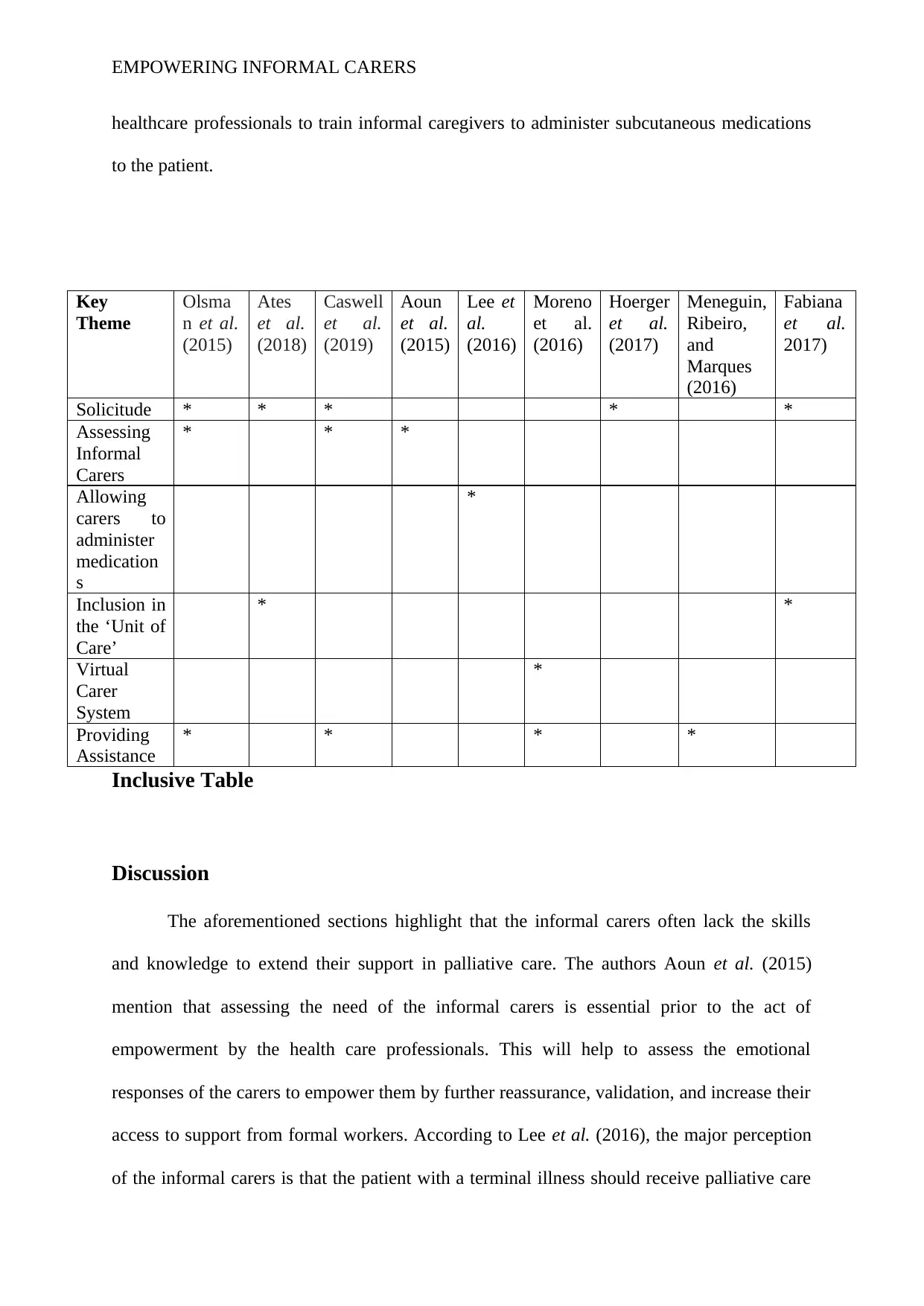
EMPOWERING INFORMAL CARERS
healthcare professionals to train informal caregivers to administer subcutaneous medications
to the patient.
Key
Theme
Olsma
n et al.
(2015)
Ates
et al.
(2018)
Caswell
et al.
(2019)
Aoun
et al.
(2015)
Lee et
al.
(2016)
Moreno
et al.
(2016)
Hoerger
et al.
(2017)
Meneguin,
Ribeiro,
and
Marques
(2016)
Fabiana
et al.
2017)
Solicitude * * * * *
Assessing
Informal
Carers
* * *
Allowing
carers to
administer
medication
s
*
Inclusion in
the ‘Unit of
Care’
* *
Virtual
Carer
System
*
Providing
Assistance
* * * *
Inclusive Table
Discussion
The aforementioned sections highlight that the informal carers often lack the skills
and knowledge to extend their support in palliative care. The authors Aoun et al. (2015)
mention that assessing the need of the informal carers is essential prior to the act of
empowerment by the health care professionals. This will help to assess the emotional
responses of the carers to empower them by further reassurance, validation, and increase their
access to support from formal workers. According to Lee et al. (2016), the major perception
of the informal carers is that the patient with a terminal illness should receive palliative care
healthcare professionals to train informal caregivers to administer subcutaneous medications
to the patient.
Key
Theme
Olsma
n et al.
(2015)
Ates
et al.
(2018)
Caswell
et al.
(2019)
Aoun
et al.
(2015)
Lee et
al.
(2016)
Moreno
et al.
(2016)
Hoerger
et al.
(2017)
Meneguin,
Ribeiro,
and
Marques
(2016)
Fabiana
et al.
2017)
Solicitude * * * * *
Assessing
Informal
Carers
* * *
Allowing
carers to
administer
medication
s
*
Inclusion in
the ‘Unit of
Care’
* *
Virtual
Carer
System
*
Providing
Assistance
* * * *
Inclusive Table
Discussion
The aforementioned sections highlight that the informal carers often lack the skills
and knowledge to extend their support in palliative care. The authors Aoun et al. (2015)
mention that assessing the need of the informal carers is essential prior to the act of
empowerment by the health care professionals. This will help to assess the emotional
responses of the carers to empower them by further reassurance, validation, and increase their
access to support from formal workers. According to Lee et al. (2016), the major perception
of the informal carers is that the patient with a terminal illness should receive palliative care
Paraphrase This Document
Need a fresh take? Get an instant paraphrase of this document with our AI Paraphraser
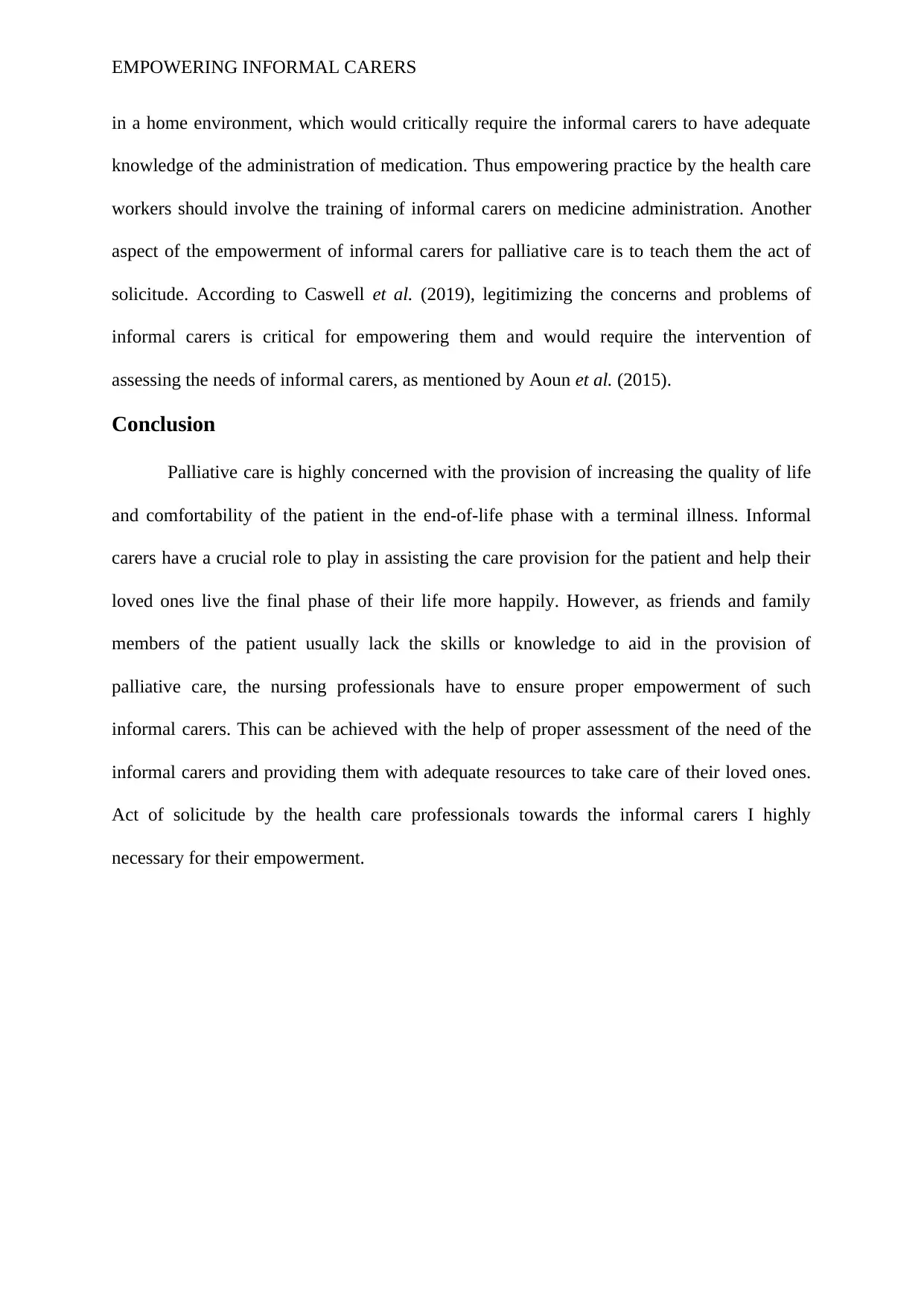
EMPOWERING INFORMAL CARERS
in a home environment, which would critically require the informal carers to have adequate
knowledge of the administration of medication. Thus empowering practice by the health care
workers should involve the training of informal carers on medicine administration. Another
aspect of the empowerment of informal carers for palliative care is to teach them the act of
solicitude. According to Caswell et al. (2019), legitimizing the concerns and problems of
informal carers is critical for empowering them and would require the intervention of
assessing the needs of informal carers, as mentioned by Aoun et al. (2015).
Conclusion
Palliative care is highly concerned with the provision of increasing the quality of life
and comfortability of the patient in the end-of-life phase with a terminal illness. Informal
carers have a crucial role to play in assisting the care provision for the patient and help their
loved ones live the final phase of their life more happily. However, as friends and family
members of the patient usually lack the skills or knowledge to aid in the provision of
palliative care, the nursing professionals have to ensure proper empowerment of such
informal carers. This can be achieved with the help of proper assessment of the need of the
informal carers and providing them with adequate resources to take care of their loved ones.
Act of solicitude by the health care professionals towards the informal carers I highly
necessary for their empowerment.
in a home environment, which would critically require the informal carers to have adequate
knowledge of the administration of medication. Thus empowering practice by the health care
workers should involve the training of informal carers on medicine administration. Another
aspect of the empowerment of informal carers for palliative care is to teach them the act of
solicitude. According to Caswell et al. (2019), legitimizing the concerns and problems of
informal carers is critical for empowering them and would require the intervention of
assessing the needs of informal carers, as mentioned by Aoun et al. (2015).
Conclusion
Palliative care is highly concerned with the provision of increasing the quality of life
and comfortability of the patient in the end-of-life phase with a terminal illness. Informal
carers have a crucial role to play in assisting the care provision for the patient and help their
loved ones live the final phase of their life more happily. However, as friends and family
members of the patient usually lack the skills or knowledge to aid in the provision of
palliative care, the nursing professionals have to ensure proper empowerment of such
informal carers. This can be achieved with the help of proper assessment of the need of the
informal carers and providing them with adequate resources to take care of their loved ones.
Act of solicitude by the health care professionals towards the informal carers I highly
necessary for their empowerment.
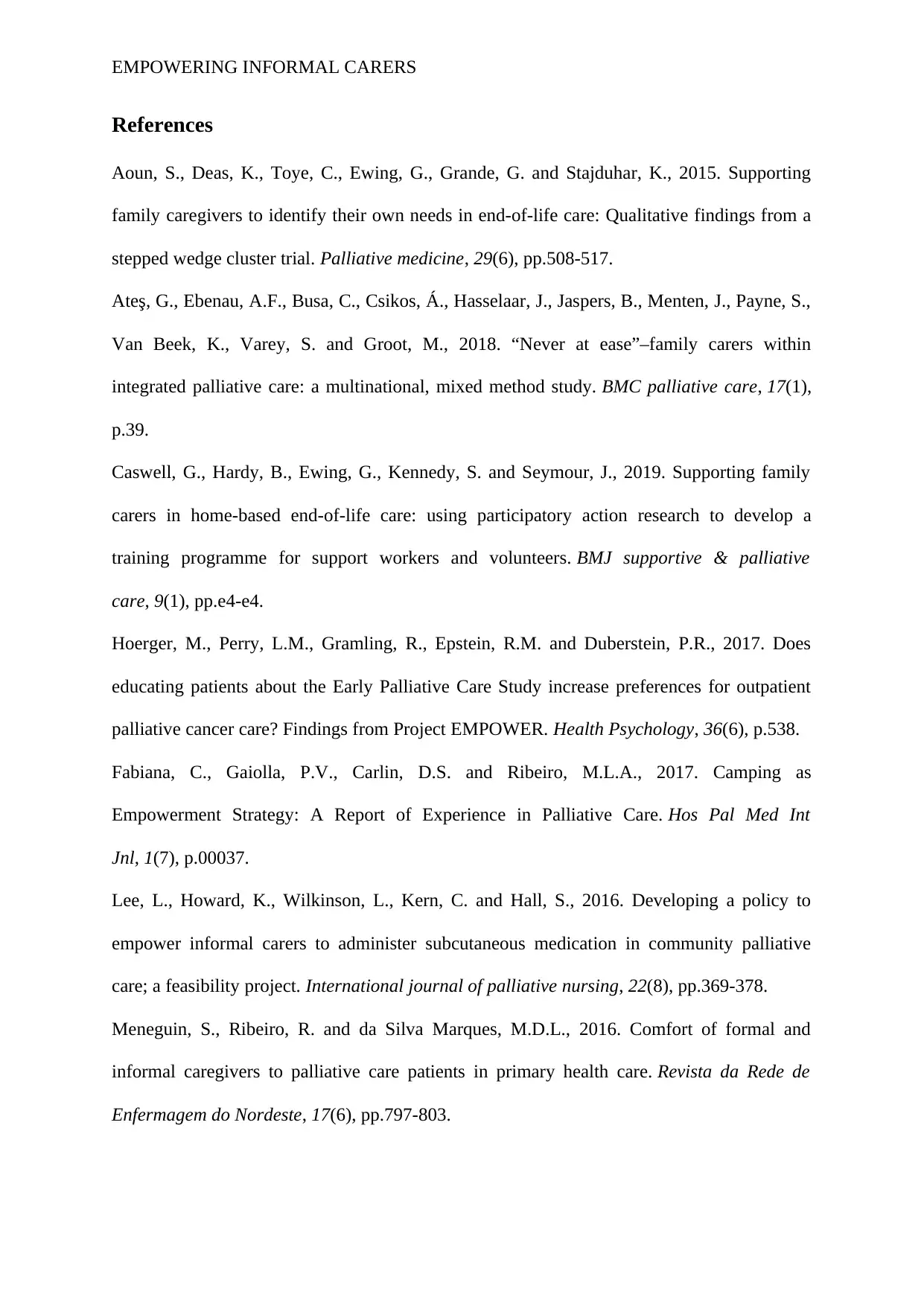
EMPOWERING INFORMAL CARERS
References
Aoun, S., Deas, K., Toye, C., Ewing, G., Grande, G. and Stajduhar, K., 2015. Supporting
family caregivers to identify their own needs in end-of-life care: Qualitative findings from a
stepped wedge cluster trial. Palliative medicine, 29(6), pp.508-517.
Ateş, G., Ebenau, A.F., Busa, C., Csikos, Á., Hasselaar, J., Jaspers, B., Menten, J., Payne, S.,
Van Beek, K., Varey, S. and Groot, M., 2018. “Never at ease”–family carers within
integrated palliative care: a multinational, mixed method study. BMC palliative care, 17(1),
p.39.
Caswell, G., Hardy, B., Ewing, G., Kennedy, S. and Seymour, J., 2019. Supporting family
carers in home-based end-of-life care: using participatory action research to develop a
training programme for support workers and volunteers. BMJ supportive & palliative
care, 9(1), pp.e4-e4.
Hoerger, M., Perry, L.M., Gramling, R., Epstein, R.M. and Duberstein, P.R., 2017. Does
educating patients about the Early Palliative Care Study increase preferences for outpatient
palliative cancer care? Findings from Project EMPOWER. Health Psychology, 36(6), p.538.
Fabiana, C., Gaiolla, P.V., Carlin, D.S. and Ribeiro, M.L.A., 2017. Camping as
Empowerment Strategy: A Report of Experience in Palliative Care. Hos Pal Med Int
Jnl, 1(7), p.00037.
Lee, L., Howard, K., Wilkinson, L., Kern, C. and Hall, S., 2016. Developing a policy to
empower informal carers to administer subcutaneous medication in community palliative
care; a feasibility project. International journal of palliative nursing, 22(8), pp.369-378.
Meneguin, S., Ribeiro, R. and da Silva Marques, M.D.L., 2016. Comfort of formal and
informal caregivers to palliative care patients in primary health care. Revista da Rede de
Enfermagem do Nordeste, 17(6), pp.797-803.
References
Aoun, S., Deas, K., Toye, C., Ewing, G., Grande, G. and Stajduhar, K., 2015. Supporting
family caregivers to identify their own needs in end-of-life care: Qualitative findings from a
stepped wedge cluster trial. Palliative medicine, 29(6), pp.508-517.
Ateş, G., Ebenau, A.F., Busa, C., Csikos, Á., Hasselaar, J., Jaspers, B., Menten, J., Payne, S.,
Van Beek, K., Varey, S. and Groot, M., 2018. “Never at ease”–family carers within
integrated palliative care: a multinational, mixed method study. BMC palliative care, 17(1),
p.39.
Caswell, G., Hardy, B., Ewing, G., Kennedy, S. and Seymour, J., 2019. Supporting family
carers in home-based end-of-life care: using participatory action research to develop a
training programme for support workers and volunteers. BMJ supportive & palliative
care, 9(1), pp.e4-e4.
Hoerger, M., Perry, L.M., Gramling, R., Epstein, R.M. and Duberstein, P.R., 2017. Does
educating patients about the Early Palliative Care Study increase preferences for outpatient
palliative cancer care? Findings from Project EMPOWER. Health Psychology, 36(6), p.538.
Fabiana, C., Gaiolla, P.V., Carlin, D.S. and Ribeiro, M.L.A., 2017. Camping as
Empowerment Strategy: A Report of Experience in Palliative Care. Hos Pal Med Int
Jnl, 1(7), p.00037.
Lee, L., Howard, K., Wilkinson, L., Kern, C. and Hall, S., 2016. Developing a policy to
empower informal carers to administer subcutaneous medication in community palliative
care; a feasibility project. International journal of palliative nursing, 22(8), pp.369-378.
Meneguin, S., Ribeiro, R. and da Silva Marques, M.D.L., 2016. Comfort of formal and
informal caregivers to palliative care patients in primary health care. Revista da Rede de
Enfermagem do Nordeste, 17(6), pp.797-803.
⊘ This is a preview!⊘
Do you want full access?
Subscribe today to unlock all pages.

Trusted by 1+ million students worldwide
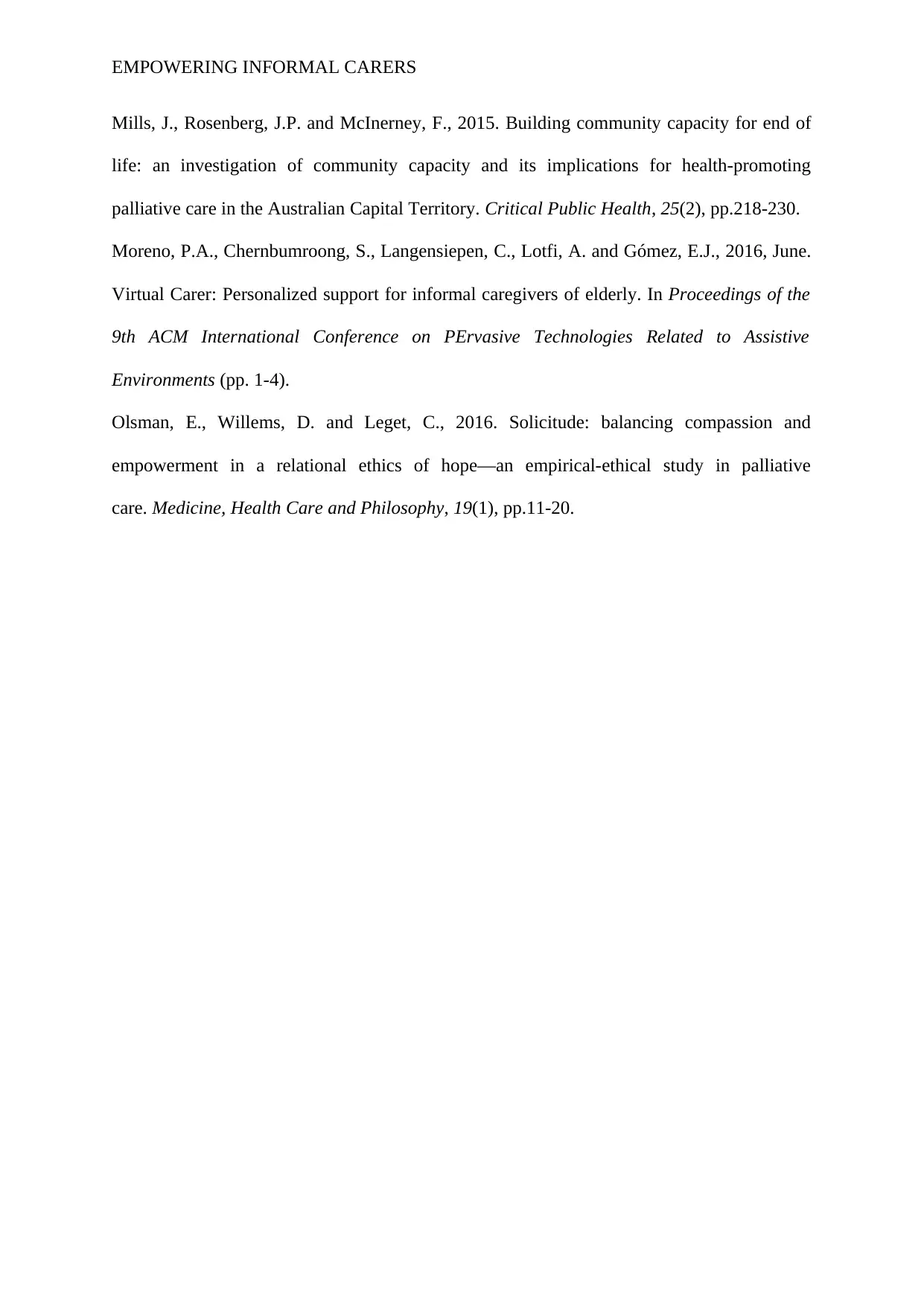
EMPOWERING INFORMAL CARERS
Mills, J., Rosenberg, J.P. and McInerney, F., 2015. Building community capacity for end of
life: an investigation of community capacity and its implications for health-promoting
palliative care in the Australian Capital Territory. Critical Public Health, 25(2), pp.218-230.
Moreno, P.A., Chernbumroong, S., Langensiepen, C., Lotfi, A. and Gómez, E.J., 2016, June.
Virtual Carer: Personalized support for informal caregivers of elderly. In Proceedings of the
9th ACM International Conference on PErvasive Technologies Related to Assistive
Environments (pp. 1-4).
Olsman, E., Willems, D. and Leget, C., 2016. Solicitude: balancing compassion and
empowerment in a relational ethics of hope—an empirical-ethical study in palliative
care. Medicine, Health Care and Philosophy, 19(1), pp.11-20.
Mills, J., Rosenberg, J.P. and McInerney, F., 2015. Building community capacity for end of
life: an investigation of community capacity and its implications for health-promoting
palliative care in the Australian Capital Territory. Critical Public Health, 25(2), pp.218-230.
Moreno, P.A., Chernbumroong, S., Langensiepen, C., Lotfi, A. and Gómez, E.J., 2016, June.
Virtual Carer: Personalized support for informal caregivers of elderly. In Proceedings of the
9th ACM International Conference on PErvasive Technologies Related to Assistive
Environments (pp. 1-4).
Olsman, E., Willems, D. and Leget, C., 2016. Solicitude: balancing compassion and
empowerment in a relational ethics of hope—an empirical-ethical study in palliative
care. Medicine, Health Care and Philosophy, 19(1), pp.11-20.
1 out of 7
Related Documents
Your All-in-One AI-Powered Toolkit for Academic Success.
+13062052269
info@desklib.com
Available 24*7 on WhatsApp / Email
![[object Object]](/_next/static/media/star-bottom.7253800d.svg)
Unlock your academic potential
Copyright © 2020–2026 A2Z Services. All Rights Reserved. Developed and managed by ZUCOL.





